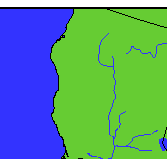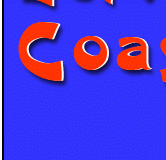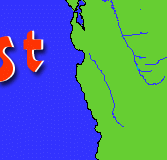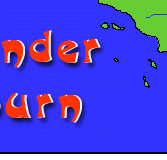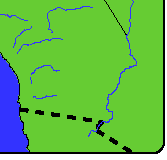Of
course there’s a big stink because the dead guys are both
American. In the end it turns out that, under certain
secret protocols in Saudi law, craft (whether maritime,
airborne or terrestrial) suspected of harboring substances
forbidden by the Koran, like alcohol, can be subject to
"interdiction," i.e. shot up or down. The Saudi
pilot claimed he’d waggled his wings at the passenger
plane, indicating that it should follow him. Only after
repeated efforts to signal had finally fired the fatal
volley.
All
a fantasy of course. True, the Saudi royal family doesn’t
endorse public consumption of alcohol, but it isn’t in
the business of shooting down booze-laden planes, however
well informed the Saudi Royal Air Force might be about
the consumption of gin aboard the suspect plane. And who
knows, the Saudi royal family might even have reservations
about the prudence, not to mention legality, of firing
on civil aircraft.
But
suppose the drug in question isn’t booze but cocaine?
And suppose the shooter’s sponsor and legal protector
isn’t the puny Saudi royal family but the Government of
the United States?
In
that case we have as policy guide the decision memorandum
signed by President Bill Clinton in June of 1994, bringing
"closure," to use a fashionable term, to acrimony
within the administration on this issue. The documents
in question are all available from the National
Security Archive, whose Kate Doyle sued for them under
the Freedom of Information Act.
As the Archive’s preamble to the documents narrates, the
U.S. began sharing real-time aerial tracking information
with Colombia and Peru in July of 1990. When the Colombians
told the US they were thinking of a shoot-down policy
for suspected drug planes, the US State Department got
nervous about possible legal ramifications, if US advisors
were involved, as they undoubtedly would be. So the State
Department proclaimed piously that both US and international
law precluded the use of weapons against civilian aircraft
except in self-defense. The Colombians said they wouldn’t
give up on the idea but would shelve it, at least for
a while.
Peru
adopted a force down policy in 1993, and at the end of
that year the Colombians (probably after back-channel
prodding from the US shoot-down faction) said they would
now implement the shoot-down strategy formulated in 1990.
A US interagency group began a review of the new policies
in January 1994. On May 1 the Clinton administration,
led by the Department of Defense, announced a suspension
on the sharing of real-time aerial tracking data with
the two governments.
This
was the signal for savage hand-to-hand bureaucratic combat
inside the US government. On the one side were ranged
those departments and agencies deriving funding and a
sense of mission in life from the War on Drugs: the State
Department’s bureaus of International Narcotics Matters
(INM) and Inter-American Affairs (ARA), not to mention
DEA, CIA, Customs, and so forth.
On the other side were the teams at the State Department’s
legal department and at Justice, offering the view that
it was a perilous strategy to shoot down civil planes
and that "mistakes are likely to occur under any
policy that contemplates the use of weapons against civil
aircraft in flight, even as a last resort." Veterans
at State remembered the tremendous, self-righteous stink
raised by the US after the Soviet Union shot down a Korean
Airliner (KAL 007) which had penetrated its air space.
The State Department cited a 1984 amendment of the Chicago
Convention on civil aviation – adopted in the wake of
the KAL incident – banning the use of force against civil
aircraft.
In
the end Clinton characteristically tried to please both
factions, while going along with the hawks. On June 21,
1994, he secretly okayed US cooperation with Colombia
and Peru’s shoot-down/forcedown policy, allowing US aerial
tracking data to be used in operations against suspicious
aircraft "if the President has determined that such
actions are necessary because of the threat posed by drugtrafficking
[sic] to the national security of that country and that
the country has appropriate procedures in place to protect
innocent aircraft."
As
one bureaucrat happily noted, this Solomonic compromise
would "reduce the [United States government’s] exposure
to criticism that such assistance violates international
law."
Colombia
and Peru would be instructed that one way to cope with
the difficulties presented by international agreements
against shooting down civil aircraft would be to declare
a "national emergency" as permitted under the
relevant conventions. Another stratagem contemplated a
campaign to convince nations deemed "aviation partners"
to accept a "narrow exception" to international
law in cases where "drug trafficking threatens the
political institutions of a state and where the country
imposes strict procedures to reduce the risk of attack
against non-drug trafficking aircraft."
One
element was conspicuous by its absence. Nowhere in the
torrent of US advice to Peru and Colombia was there any
hint that military and intelligence assistance from the
US might be conditioned on a solution to the international
legal problems. Significantly, the document notes that,
"The President explicitly did not condition the resumption
of assistance on a solution to the international law problems
associated with the USG’s provision of such assistance."
As the US State Department proudly (but of course secretly)
boasted to President Samper of Colombia in December of
that year, the Clinton administration had made "a
tremendous legal and administrative effort" to get
the intelligence sharing arrangements back on track. Ambassador
Busby was told to tell President Samper, that "Because
narcotics is very important to us, the administration
expended a great deal of effort to change US law and permit
us to resume our cooperation."
By
the way, the Aircraft Owners and Pilots Association did
think the policy was a lousy idea.
The
world took notice in March of this year when a family
of evangelical Baptists, having concluded a bout of predatory
spiritual rampages among the hapless Indians along the
Peruvian Amazon, was halved in size, after a bullet fatally
pierced Veronica and Charity Bower (mother and 7-month
infant) while wounding Cessna pilot Kevin Donaldson and
sparing the Baptist paterfamilias, Jim Bower, and his
son Cory.
Magnanimously,
Bower he had "no hard feelings" and could see
God at work in their deaths from gunfire by the Peruvian
air force. "Cory and I are experiencing inexplicable
peace, and to me that’s proof that God is in this,"
Bowers told about 600 mourners at the funeral of his wife
and daughter. "Our attitude toward those responsible
is one of forgiveness. Is that not amazing? It shouldn’t
be amazing to us Christians.’"Roni and Charity were
instantly killed by the same bullet. To me that’s pretty
amazing. That bullet stayed in Charity’s head, not going
through Kevin’s back, causing the rest of us to die."
By sparing him, his son and Donaldson, Bowers said God
must have something bigger in mind for them, although
he didn’t know what it was.
Of
course, if an Amazonian Indian shaman had successfully
aimed a heat-seeking missile at the Bowers on the very
reasonable grounds (sustainable by profuse historical
evidence) that the evangelical Baptists were a threat
to the national security of his tribe, there would have
been no end of trouble for the shaman.
But
this was no shaman, this was the Peruvian Air Force, ordered
to fire by a high ranking Peruvian officer on the ground.
And this was the CIA, in the subcontracted guise of Aviation
Development Corp., out of Maxwell AFB in Hunstville, Alabama,
flying above the Amazon (two Anglos and one Peruvian,
not able to talk to each other very well owing to language
barriers) telling the Peruvian Air Force that an unidentified
plane was approaching Iquitos. And this was long-range
US radar based in Vieques, Puerto Rico, advising the CIA
subcontractors about the unidentified plane. And this
was US Southern Military Command, monitoring the whole
scene from its war room in Key West. What a very large
mass of people and resources to be watching one small
plane, which if you believe Mr. Bower, was also being
tracked by the mightiest radar of them all, the Big Fellow
himself.
It
turns out the CIA, the subcontractors and Southcom and
Colombia and Peru have been responsible for downing anywhere
from 25 to 30 small planes over the passage of the years
since 1994. Who were they? No one seems to know and please,
the occupants of these planes weren’t murdered in acts
of international terrorism and piracy. No, they were "successfully
interdicted", thus bringing a glow of satisfaction
to the cheeks of those waging the war on drugs.
Okay.
Now you’re in your cruise ship, in the Indonesian archipelago,
still
sipping at your gin and tonic. Muslims board the boat,
ransack your
possessions. Yes, they’re dead set against booze…
I’ll
cut the satirical parable short and remind you that in
mid May the US Coast Guard ecstatically announced the
largest haul in US maritime drug enforcement’s history:
an alleged $1 billion’s worth of cocaine, (13 tons) found
after five arduous days’ search aboard a freighter in
the eastern Pacific the Svesda Maru, a 152-foot trawler
flying the flag of Belize. Two Russians and 10 Ukrainians
were charged with drug smuggling and jailed at the federal
prison in downtown San Diego.
On March 4, another Belize-flagged fishing ship, the Forever
My Friend, with 8.8 tons of cocaine, had been towed into
San Diego after being seized 250 miles west of Acapulco.
Count
up the seeming breaches of laws and treaties here, starting
with piracy on the high seas and use of US Navy ships
for law enforcement. But it turns out when US Customs
or Coast Guard is alerted by the US Navy or Air Force
to suspicious craft outside territorial waters, they phone
the State Department, which phones the nation under whose
flag the suspect is floating and gets the green light.
So Belize is going to say No?
And
just to cope with the Posse Comitatus Act forbidding the
US military to be involved in civil law enforcement there
was a Coast Guard unit aboard the Navy’s ship. You want
to ask about the likelihood of a fair and speedy trial
for those Russians and Ukrainians now in the federal pen
in San Diego?
Want
to have the spring’s drug headlines wrapped up for you?
The US Supreme Court defies the clear intent of voters
in nine states and says medical marijuana is a no no and
a London newspaper reports that in London in 1995 a gram
of cocaine cost around $120, but the same amount can now
be picked up for about $80. The new drug czar, John Walters,
picked after three months by former cocaine dealer George
Bush (at Yale, in ounce bags according to one source)
says the war on drugs can be won.
Gin
and tonic, anyone?
Copyright
© 2001 Alexander Cockburn
Please
Support Antiwar.com

